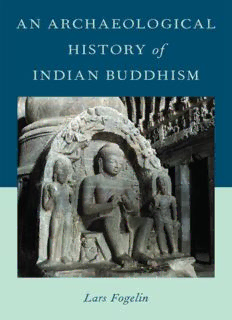
An Archaeological History of Indian Buddhism PDF
Preview An Archaeological History of Indian Buddhism
An Archaeological History of Indian Buddhism An Archaeological History of Indian Buddhism w Lars Fogelin 1 1 Oxford University Press is a department of the University of Oxford. It furthers the University’s objective of excellence in research, scholarship, and education by publishing worldwide. Oxford New York Auckland Cape Town Dar es Salaam Hong Kong Karachi Kuala Lumpur Madrid Melbourne Mexico City Nairobi New Delhi Shanghai Taipei Toronto With offices in Argentina Austria Brazil Chile Czech Republic France Greece Guatemala Hungary Italy Japan Poland Portugal Singapore South Korea Switzerland Thailand Turkey Ukraine Vietnam Oxford is a registered trademark of Oxford University Press in the UK and certain other countries. Published in the United States of America by Oxford University Press 198 Madison Avenue, New York, NY 10016 © Oxford University Press 2015 All rights reserved. No part of this publication may be reproduced, stored in a retrieval system, or transmitted, in any form or by any means, without the prior permission in writing of Oxford University Press, or as expressly permitted by law, by license, or under terms agreed with the appropriate reproduction rights organization. Inquiries concerning reproduction outside the scope of the above should be sent to the Rights Department, Oxford University Press, at the address above. You must not circulate this work in any other form and you must impose this same condition on any acquirer. Cataloging-in-Publication data is on file at the Library of Congress ISBN 978–0–19–994821–5 (hbk.); 978–0–19–994823–9 (pbk.) 1 3 5 7 9 8 6 4 2 Printed in the United States of America on acid-free paper For Alice, my partner in life and crime CONTENTS Acknowledgments ix A Note on Transliteration xi 1. Introduction: The Archaeology and History of Indian Buddhism 1 2. The Material of Religion 34 3. From the Buddha to Ashoka: c. 600–200 bce 70 4. The Sangha and the Laity: c. 200 bce–200 ce 104 5. The Beginnings of Mahayana Buddhism, Buddha Images, and Monastic Isolation: c. 100–600 ce 146 6. Lay Buddhism and Religious Syncretism in the First Millennium ce 180 7. The Consolidation and Collapse of Monastic Buddhism: c. 600–1400 ce 202 8. Conclusion 225 Bibliography 235 Index 247 ( vii ) ACKNOWLEDGMENTS This book is the product of almost twenty years of work on ancient Indian Buddhism. I began studying Buddhist archaeology as a graduate student at the University of Michigan in 1995. I continued my research while working at Albion College, Southern Illinois University at Carbondale, and the University of Arizona. During this time my research has been greatly helped by the guidance and insights of my peers, professors, colleagues, and students. I particularly thank Dr. Carla Sinopoli for her time, advice, and encouragement. This book synthesizes, modifies, and extends on my previous publications. This book would not have been possible without the efforts of the editors and reviewers who have carefully combed through my previous book and articles, poking holes in my arguments and sug- gesting new avenues to consider. Small portions of this book were adapted from previous publications. For the most part, these sections are only few paragraphs. In some cases, I have adapted a few pages. These sections have all been modified or amended based upon my current understanding of Buddhism and the needs of this particular work. I would like to thank my colleagues and mentors in India. In particu- lar, Dr. Himanshu P. Ray and Dr. Aloka Parasher-Sen have helped shape my thinking about ancient India. While conducting research in India, I received the invaluable assistance of the American Institute of Indian Studies. Without their efforts to obtain permits and facilitate introduc- tions, my archaeological research would never have occurred. The research that informs portions of Chapter 4 of this book was greatly facilitated by the Andhra Pradesh Department of Archaeology and Museums, par- ticularly Dr. B. Subrahmanyam and Dr. E. Sivanagi Reddy. I also thank the many students from Deccan College and Jawaharlal Nehru University who have worked with me in the field over the years. In the last two decades, my research has been supported by several organizations. The greatest assistance has come from the Wenner-Gren Foundation, who supported my dissertation fieldwork in India (Gr. 6597) and allowed me to dedicate the 2012–2013 academic year to writing this ( ix )
Description: